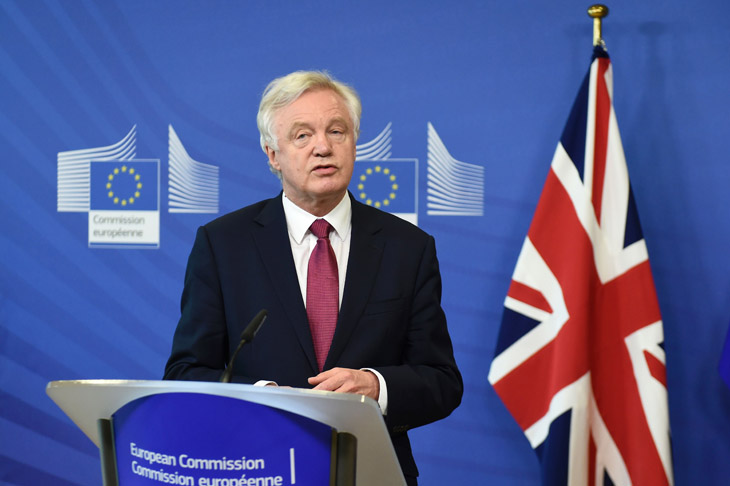The unexpected outcome of the general election has led some to hope that a weakened government will be forced to pursue a ‘softer’ Brexit. They are right to think that the emphasis of the negotiation will have to change, but they use the wrong adjective. The choice before David Davis and his team as they start work in Brussels is not and never has been between ‘soft’ and ‘hard’ Brexit; it is between an open Brexit and a closed Brexit.
The former is one where Britain retains open trade with, and a high degree of free movement to and from, other EU countries — as well as taking fresh opportunities to liberalise trade with the world beyond. The latter is one where Britain loses its open trade with the EU, fails to open up trade with the rest of the world, and uses its exit from the single market to close down or severely restrict migration.
There really should be little difficulty in choosing which to pursue. The former will make the country richer, the latter will make it poorer. There has been a lot of talk of ‘red lines’ in the negotiations but there should be only two. Whatever deal finally emerges, it must retain tariff-free access to the single market and it must allow us full freedom to cut our own trade deals with countries outside the EU. Everything else can be open to compromise.
Agreeing to respect the rights of EU citizens already resident in Britain and who moved their careers and families here in good faith should be the work of a moment. As for free movement — which EU negotiators have indicated could be a sticking point if Britain wants to retain access to the single market — the government should have little problem conceding ground. When David Cameron was negotiating his failed new relationship with the EU, his main demand was to save Britain from having to pay welfare benefits to citizens of other EU countries until they had been working and paying taxes here for several years. That should be the government’s position now: free movement to work and to study, but without the obligation to pay benefits.
Trying to restrict net migration to an arbitrary target of 100,000, as Theresa May continues to do, misses the point because it fails to make a distinction between people who will make a positive contribution to the UK economy and those who will not. She should focus on skills, not numbers. More-over, it makes even less sense to include overseas students in the target, as their education is really an export industry.
While Remainers like to portray the EU as a great champion of free trade, it has proved very slow and ineffective at opening up trade with non-member states. It might have hundreds of trade experts, but they have never succeeded in striking a deal with any of their major trade partners: specifically the US, China and Japan. Switzerland, meanwhile, has managed to complete bilateral deals with the last two. Whenever the EU attempts to open up trade with the outside world, protectionist instincts seem to kick in, especially over agriculture. This is not the British way, which is why so many voted Leave — so we can look to more distant horizons.
Most European countries would like to do the same: a poll from the American Pew Research Center last weekend showed that the French, Spanish, Italians and Swedes all believe that national governments, not the EU, should be in charge of trade deals. But Britain is the only member state that can achieve this, by leaving the customs union. That’s why it is illogical to leave the EU but stay trapped in its protectionist trading bloc. Acquiring freedom over trade deals would be perhaps the single best thing about Brexit.
The one other sticking point is going to be the EU ‘leaving bill’. It has not helped negotiations that the EU has so far behaved like one of those gangs that tarmac your driveway without asking and then start threatening you for payment. The demand for £50 billion, or even £85 billion, from Britain to cover the cost of EU projects far into the future is nothing more than a speculative invoice. There is no legal basis for it, and the protocol laid out in the Lisbon Treaty for a country which wants to leave the EU makes no mention of it.
The EU has demanded that this be discussed first, before any trade deal. That, at least, is not a bad idea. If Davis and his team can firmly resist it from the outset, and remind the EU that walking away without paying a penny is an option for Britain, we can get the nasty bit out of the way first. The chances of getting a good deal are directly linked to the plausibility with which Britain can present the ‘no deal’ scenario — which would mean falling back on the default terms of the World Trade Organisation, whose rules govern our relations with the United States and most other countries. If this option is examined properly by the government, then the strength of Britain’s position will become clear.
When that is done, we can get on with making an open deal which will be in everyone’s interest.
Got something to add? Join the discussion and comment below.
Get 10 issues for just $10
Subscribe to The Spectator Australia today for the next 10 magazine issues, plus full online access, for just $10.
You might disagree with half of it, but you’ll enjoy reading all of it. Try your first month for free, then just $2 a week for the remainder of your first year.














Comments
Don't miss out
Join the conversation with other Spectator Australia readers. Subscribe to leave a comment.
SUBSCRIBEAlready a subscriber? Log in